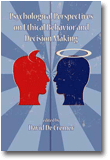
Psychological Perspectives on Ethical Behavior and Decision Making
Edited by:
David DeCremer, Erasmus University
Published 2009
The book is divided into three relatively coherent sections that focus on understanding the emergence of (un)ethical decisions and behaviors in our work and social lives by adopting a psychological framework. The first section focuses on reviewing our knowledge with respect to the specific notions of ethical behavior and corruption. These chapters aim to provide definitions, boundary conditions and suggestions for future research on these notions.
The second section focuses on the intra-individual processes (affect, cognition and motivation) that determine why and how people display unethical behavior and are able to justify this kind of behavior to a certain extent. In these chapters the common theme is that given specific circumstances psychological processes are activated that bias perceptions of ethical behavior and decision making.
The third section explores how organizational features frame the organizational setting and climate. These chapters focus on how employment of sanctions, procedurally fair leadership and a general code of conduct shapes perceptions of the organizational climate in ways that it becomes clear to organizational members how just, moral and retributive the organization will be in case of unethical behavior.
CONTENTS
PART I: INTRODUCTION. Psychology and Ethics: What It Takes to Feel Ethical When Being Unethical, David De Cremer. PART II: REFLECTIONS ON (UN)ETHICAL BEHAVIOR. On the Causes and Conditions of Moral Behavior: Why is This All We Know? Scott J. Reynolds and Tara L. Ceranic. Psychological Processes in Organizational Corruption, Celia Moore. PART III: PROCESSES WITHIN THE INDIVIDUAL AND ETHICAL BEHAVIOR. Moral Self-Regulation: Licensing and Compensation, Chen-Bo Zhong, Katie Liljenquist, and Daylian M. Cain. Ethical Standards in Gain versus Loss Frames, Jessica S. Cameron and Dale T. Miller. Why Leaders Feel Entitled to Take More: Feelings of Entitlement As a Moral Rationalization Strategy, David De Cremer, Eric van Dijk, and Chris P. Reinders Folmer. Actual and Potential Exclusion as Determinants of Individuals’ Unethical Behavior in Groups, Madan M. Pillutla and Stefan Thau. When The Need to Trust Results in Unethical Behavior: The Sensitivity to Mean Intentions (SeMI) Model, Mario Gollwitzer and Tobias Rothmund. The Neural Basis of Morality, Maarten A. S. Boksem and David De Cremer. PART IV: THE SOCIAL CONTEXT AND ETHICAL BEHAVIOR. The Two-Fold Influence of Sanctions on Moral Concerns, Laetitia B. Mulder. Making Ethical Climate a Mainstream Management Topic: A Review, Critique, and Prescription for the Empirical Research on Ethical Climate, David M. Mayer, Maribeth Kuenzi, and Rebecca L. Greenbaum. Ethics and Rule Adherence in Groups, Tom Tyler and David De Cremer. Biographical Sketches.
-
Paperback978-1-60752-105-1
Web price: $45.04 (Reg. 52.99)
-
Hardcover978-1-60752-106-8
Web price: $80.74 (Reg. 94.99)
- eBook9781607522768

- BUS008000 - BUSINESS & ECONOMICS: Business Ethics
- BUS041000 - BUSINESS & ECONOMICS: Management
- BUS030000 - BUSINESS & ECONOMICS: Human Resources & Personnel Management
-
 Dark and Destructive Leadership
Dark and Destructive Leadership
-
 Digital Transformation
Organizational Challenges and Management Transformation Methods
Digital Transformation
Organizational Challenges and Management Transformation Methods
-
 Diversity, Equity, and Inclusion Insights in Practice
Diversity, Equity, and Inclusion Insights in Practice
-
 Human Resource (Talent) Development
Human Resource (Talent) Development
-
 Management Consulting in the Era of the Digital Organization
Management Consulting in the Era of the Digital Organization
-
 Perspectives on Race in Organizations
Perspectives on Race in Organizations
-
 The Entrepreneurship SIG at the European Academy of Management
Setting the Base for Tomorrow's Challenges
The Entrepreneurship SIG at the European Academy of Management
Setting the Base for Tomorrow's Challenges

